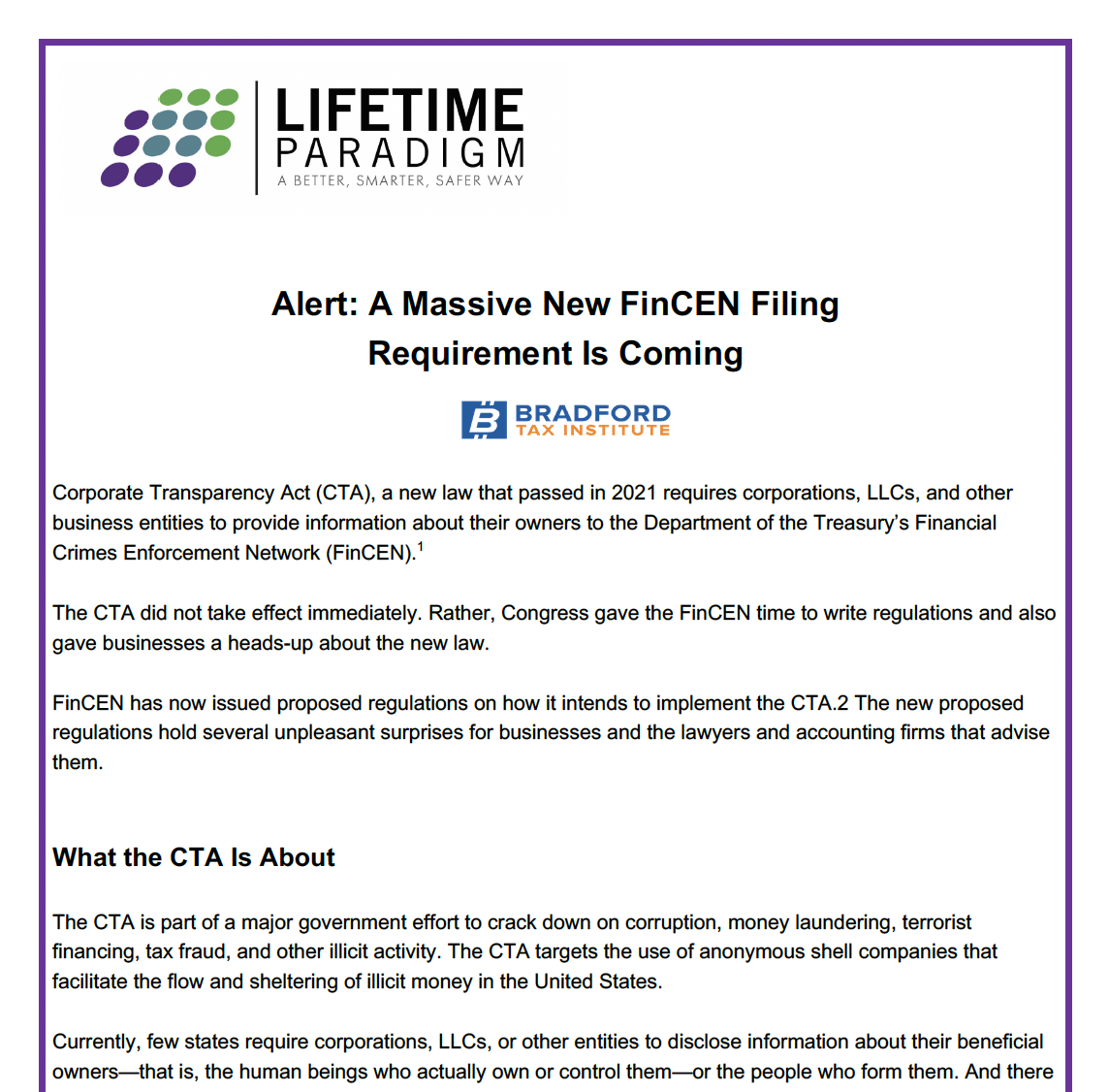Tax Planning
Alert: A Massive New FinCEN Filing Requirement is Coming
by Bradford Institute
Do you own or advise a corporation, limited liability company (LLC), limited partnership, limited liability partnership, limited liability limited partnership, or business trust?
Or are you planning to form one of these entities?
If so, be alert. There’s a new federal filing requirement coming.
Back in 2021, Congress passed a new law called the Corporate Transparency Act (CTA) that requires corporations, LLCs, and other business entities to provide information about their owners to the Department of the Treasury’s Financial Crimes Enforcement Network (FinCEN), which is a unit separate from the IRS.
The CTA is part of a government crackdown on corruption, money laundering, terrorist financing, tax fraud, and other illicit activity. It targets the use of anonymous shell companies that facilitate the flow and sheltering of illicit money in the United States.
Businesses subject to the law will have to file a “beneficial owner report” with FinCEN, including each beneficial owner’s full legal name, date of birth, and residential street address, as well as an identifying number from a legal document such as a driver’s license or passport. FinCEN will include the information in a database for use by law enforcement, national security and intelligence agencies, and federal regulators that enforce anti-money-laundering laws. The database will not be publicly accessible.
Violations of the CTA can result in a $500-a-day penalty (up to $10,000) and up to two years’ imprisonment.
The CTA did not take effect immediately. Rather, Congress gave the FinCEN time to write regulations governing how the CTA should be applied and to give businesses a heads-up about the new law. FinCEN has now issued its proposed regulations, and they take a fairly hard line on how the law will be applied.
Here are four things the new regulations make clear.
- The filing requirement may begin soon. The CTA goes into effect when the proposed regulations become final, which is expected to occur sometime between mid- and late 2022. As soon as it goes into effect
- new corprations, LLCs and other entities will have to comply with the filing requirement within 14 days of being formed, and
- existing entities will have one year to comply.
- Millions of small businesses are affected. The reporting requirements will apply to almost every small business that is not a sole proprietorship or general partnership, including corporations, LLCs, limited liability partnerships, limited liability limited partnerships, business trusts, and most limited partnerships—over 30 million in all.
Larger companies with over 20 full-time employees and $5 million in gross receipts are exempt.
- There will be many beneficial owners. The proposed regulations make it clear that a company can have multiple beneficial owners, and it may not always be easy to identify them all. There are two broad categories of beneficial owners:
- any individual who owns 25 percent or more of the company, and
- any individual who, directly or indirectly, exercises substantial control over the company.
- Law and accounting firms are not exempt. Neither the CTA nor the proposed regulations contain any exemption for legal or accounting firms, except for the relatively few public accounting firms registered under Section 102 of the Sarbanes-Oxley Act of 2002. Thus, any law or accounting firm that is a professional corporation or an LLC will have to file a beneficial owner report unless it has more than 20 employees and $5 million in annual income.
Additional Information Below…

SERVICES WE OFFER RELATED TO THIS TOPIC
The information contained in this post is for general use and educational purposes only. However, we do offer specific services to our clients to help them implement the strategies mentioned above. For specific information and to determine if these services may be a good fit for you, please select any of the services listed below.
The 4x4 Financial Independence Plan ℠
Retirement Planning
Tax Planning
Coaching and Consulting
EP 0012. The Three Generations of Annuities
The Financial Independence Now Podcast Hosted by Randy LuebkeIn Episode 12 of the Financial Independence Now podcast,...
11 Financial Tips to Make Caregiving Easier
Tax Planning Caregivers generally tend to their elderly/ disabled family members as a labor of love, but it can also...
EP 0011. Budgeting for Dummies
The Financial Independence Now Podcast Hosted by Randy LuebkeIn this episode of Financial Independence Now, host Randy...
Investment Advisory Services are offered through Lifetime Financial, Inc., a Registered Investment Advisory. Insurance and other financial products and services are offered through Lifetime Paradigm, Inc. or Lifetime Paradigm Insurance Services. Neither Lifetime Financial, Inc. nor Lifetime Paradigm, Inc., or its associates and subsidiaries provide any specific tax or legal advice. Only guidance is provided in these areas. For specific recommendations please consult with a qualified, licensed Advisor. Past performance is no guarantee of future results. Your results can and will vary. Investments are subject to risk, including market and interest rate fluctuations. Investors can and do lose money and, unless otherwise noted, they are not guaranteed. Information provided is for educational purposes only and is not intended for the sale or purchase of any specific securities product, service or investment strategy. BE SURE TO FIRST CONSULT WITH A QUALIFIED FINANCIAL ADVISER, TAX PROFESSIONAL, OR ATTORNEY BEFORE IMPLEMENTING ANY STRATEGY OR RECOMMENDATION DISCUSSED HEREIN.
This message is intended for the use of the individual or entity to which it is addressed and may contain information that is privileged, confidential and exempt from disclosure under applicable law. If you are not the intended recipient, any dissemination, distribution or copying of this communication is strictly prohibited. If you think you have received this communication in error, please notify us immediately by reply e-mail or by telephone (800) 810-1736 and delete the original message.
This notice is required by IRS Circular 230, which regulates written communications about federal tax matters between tax advisors and their clients. To the extent the preceding correspondence and/or any attachment is a written tax advice communication, it is not a full "covered opinion." Accordingly, this advice is not intended and cannot be used for the purpose of avoiding penalties that may be imposed by the IRS.





